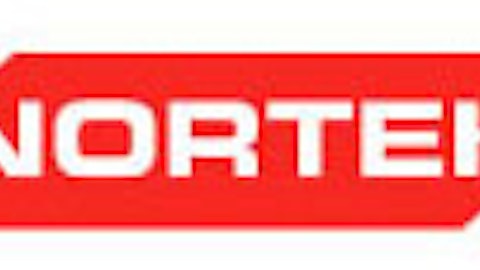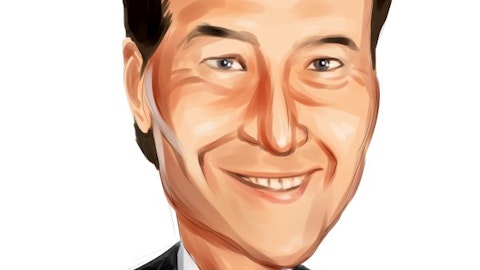Outerwall, Pandora, Achillion, hedge funds: It’s no secret that at Insider Monkey, we track hedge funds (discover why here). While a good portion of our analysis covers quarterly 13Fs with the SEC, we also make it a point to cover day-to-day 13D and 13G filings. The former typically details the moves of an activist investor in a particular company, while a 13G indicates when a passive stake has been taken. Over the past week, there were a few moves that caught our eye in particular; let’s take a look.
Outerwall
In one of the latest filings on last Friday afternoon, Jana Partners and Barry Rosenstein disclosed a 13.5% stake in Outerwall Inc (NASDAQ:OUTR) via a 13D. Shares of the automated kiosk company popped significantly in the last five minutes of regular market action last week, finishing Friday up 9.4% and +16.5% for the entire week.
As is the case in most of Jana’s activist positions, the filing itself mentioned a few motives why Rosenstein and his team are bullish. The reasons mentioned by Jana include: 1) Outerwall’s stock is “undervalued,” 2) the possibility of a sale of Outerwall in parts or as a single transaction, and 3) a “significant return of capital” most likely in the form of a share buyback or dividend issuance.
For starters, we agree with Jana that Outerwall is significantly undervalued. Shares trade at a mere shell of the multiples they truly deserve, and at 10.6 times forward EPS and a PEG of 0.66, earnings prospects are particularly cheap. Wall Street expects Outerwall to generate a bottom line growth of 20% a year through 2018, which looks to be driven primarily by the company’s Redbox and Coinstar kiosks. In addition to movie rentals and coin counting, Outerwall’s partnership with Starbucks Corporation (NASDAQ:SBUX) to deliver Seattle’s Best coffee through Rubi-branded kiosks has long-term potential, and its acquisition of ecoATM is a smart niche investment.
While it’s unknown just what assets Jana would seek to shave off in a partial sale, it is worth mentioning that Outerwall did reject a takeover bid from Providence Equity Partners last year. With over $250 million in the bank, a small dividend is a possibility but for a company that booked $2.2 billion in revenue last year, a market cap of only $1.6 billion means that a full buyout might be the first thing Jana pushes for. We’ll continue to watch this situation very closely, and you’d be well served to keep an eye on Barry Rosenstein’s hedge fund moving forward.
Pandora
This was perhaps the second biggest hedge fund trade of the past week, aside from Dan Loeb’s Sothebys (NYSE:BID) slam that we already covered here on Seeking Alpha. We’re talking about Stephen Mandel and Lone Pine Capital’s move into Pandora Media Inc (NYSE:P). In a 13G filing disclosed last Thursday, Mandel’s fund announced a 5.3% stake in the streaming music provider. Due to the fact that this was a passive filing that wasn’t activist in nature, we can assume that Mandel will not seek to disrupt Pandora’s current business model.
Despite the fact that Pandora faces increasing competition from Apple Inc. (NASDAQ:AAPL) and Google Inc (NASDAQ:GOOG)’s own radio services, Mandel looks to be bullish on the company’s advertising growth. On top of boosting its commercial frequency while continuing to perfect its video ad strategy, Pandora’s recent decision to name Brian McAndrews as CEO is promising.
McAndrews was an ad exec with Microsoft Corporation (NASDAQ:MSFT) and also previously worked with Madrona Venture Group, so it’s clear what the company’s board wants its primary focus to be. Mobile advertising should also be an important business for investors to watch going forward, as it now makes up close to 75% of Pandora’s total top line; this figure sat below 60% last year.
In addition to Mandel, Israel Englander and Paul Tudor Jones established new positions in Pandora last quarter, and all three have been known to make their fair share of growth-based investments regardless of valuation. With Pandora’s earnings growth estimated to average 45% a year over the next half-decade, we’ll chalk it up as another momentum play.
Achillion Pharmaceuticals
Last but certainly not least, Achillion Pharmaceuticals, Inc. (NASDAQ:ACHN) was part of another big move in the hedge fund world last week. Peter Kolchinsky’s biotech fund, RA Capital, disclosed a stake of nearly 15% in Achillion via a 13G filing. Kolchinsky is a virology Ph.D. from Harvard and he founded RA Capital in 2001 with seed money from Vertex Pharmaceuticals Incorporated (NASDAQ:VRTX) co-founder Rich Aldrich. Judging by his fund’s near exclusivity in the healthcare sector, it’s no surprise that his latest bet it on a company in this area.
It is a surprise, though, that he decided to bet on Achillion. The stock is down a whopping 63% in the past five trading days, as news of the FDA’s decision to keep Sovaprevir—the company’s hepatitis C drug currently in Phase II trials—on hold due to “abnormal liver results,” according to a Bloomberg report. It appears that for all intents and purposes, Sovaprevir is done as a potential HCV treatment, and most analysts expect Achillion to now focus on the remaining drugs in its pipeline.
The company still has the compound ACH-3102 in Phase II, ACH-2684 in Phase I and ACH-3422 in preclinical trials, so it’s possible that Kolchinsky is bullish on one of these drugs becoming a viable HCV treatment option. There’s also a chance that the hedge fund manager could think that Sovaprevir still has more life in it, but for now, there’s no way to know.
The only thing Kolchinsky and RA Capital’s move tells us is that they saw a value opportunity with Achillion taking a massive price drop last week. Shares do currently trade at a depressed cash flow multiple about half that of industry norms. The company isn’t profitable yet so unless you’re confident in Achillion’s ability to avoid further flogging from the FDA, we’d avoid investing here just yet. Instead, it wouldn’t be a bad idea to study how Kolchinsky trades the stock in the coming months
Disclosure: none






